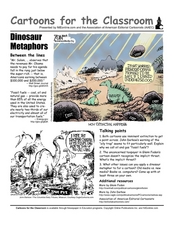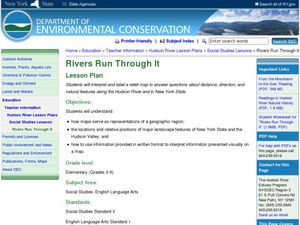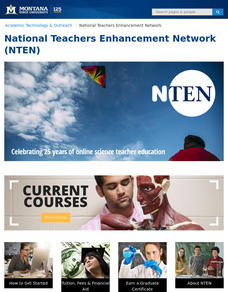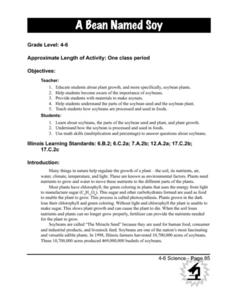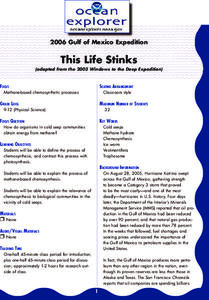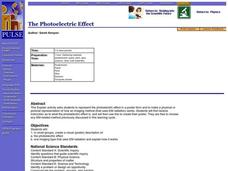Curated OER
Transportation Fuels: Biodiesel
Students examine biodiesel as a fuel for transportation. In this biodiesel lesson students complete activities using their critical thinking.
Curated OER
Fossil Fuels and the Debt Crisis: Political Cartoons
Wondering what dinosaurs have to do with the debt crisis? This analysis handout includes two political cartoons using dinosaur metaphors, and prompts pupils to consider the symbolism to understand the cartoonist's point. You may want to...
Clean Up Australia
Why are Batteries Harmful to the Environment?
Open this lesson by reading together about primary and secondary batteries (such as nickel-cadmium cells), problems they can cause in the environment, and how humans can minimize the damage. Afterward, little ones examine a collection of...
National Energy Education Development Project
Exploring Hybrid School Bus Technology
The color School Bus Yellow was created in 1939 because science had proven peripheral vision detects yellow 1.24 times faster than other colors. Young scientists explore modern school bus transportation options and then discuss the types...
University of North Carolina
Brainstorming
Did you just hear thunder? Nope, you heard the sound of another kind of storm—a brainstorm! A handout teaches writers about different kinds of brainstorming and provides options for them to try when beginning to write their own papers....
Curated OER
Water Around Us
Students create a collage of human land use activities around a body of water. Students evaluate the effects of different kinds of land use on wetland habitats, and create a list of pros and cons for each land use.
Curated OER
Native Beauty
Students plant wild flowers and maintain their garden. In this wild flowers lesson plan, students pick and prepare a gardening site, plant wild flowers, and maintain it everyday.
Curated OER
What Parts of a Plant Do We Eat?
Did you know that tomtoes and cucumbers are actually fruits? Biology or botany beginners read about the function of flowers and fruit and find that some food items commonly called vegetables are, by definition, also fruits! Give learners...
Curated OER
River Run Through It
With vocabulary lists, worksheets, and more, this lesson sets learners on an exploration of the Hudson River area. They read an essay about the area, analyze a relief map of New York State, and complete a worksheet.
Curated OER
Where is Away?
Focusing on where are garbage goes once we dispose of it, learners explore environmental concerns. Using a clear format, this lesson leads learners through a discussion of waste reduction, recycling, and composting. Then, they discuss...
Curated OER
Stream Quality Assessment
Pupils investigate many of the factors that affect water quality. They take measurements and water samples at a local stream and evaluate the health of their community's watershed. They write a report detailing their findings.
Curated OER
Structure of Matter
Fifth graders, in groups, distinguish between mixtures, solutions and suspensions.
Curated OER
Corn Harvest
Students read Corn Belt Harvest and write sentences about corn's uses. They visit a cornfield and a grain elevator or have guest speakers come to class. They design posters about harvesting or processing corn into grain.
Curated OER
Soybeans: The Miracle Seed
Students discover why soybeans are called the "miracle seeds." They make their own soynuts and share other foods made from soybeans. They create a bulletin board of soybean products.
Curated OER
Air Quality Issues
Students identify the different layers of the atmosphere. They examine the different types of air pollutants. They also discover laws in effect that work to protect the environment.
Curated OER
This Life Stinks
Chemosynthetic communities of cold seep areas are considered in this lesson. Working in collaborative groups, marine biology or oceanography learners research and prepare a report about oxidation-reduction reactions involved with...
Curated OER
Into a New Millennium, Lesson 4: 1970 to Present
Learners view different slides on how agriculture has changed in America. In groups, they are given one resource to read and answer discussion quesions. After reviewing answers, they participate in different scenerios to help protect...
Curated OER
Go To The Head of the Cloud
Students pretend they are water droplets traveling through the water cycle. Using their text, they discover the steps in the cycle and the different paths water can take. They write a report about their journey through the water cycle...
Curated OER
The Photoelectric Effect
After some online instruction, chemistry aces use their creative abilities to produce a poster describing the photoelectric effect and one type of imaging technology that uses electromagnetic radiation. This simple, straightforward...
Curated OER
Sound
Third graders explore sound. They describe sounds in terms of their properties and explain how sounds are made. Students discuss how various sounds sound to their ears and how sound travels in waves.
Curated OER
Rain Forest Terrariums
Fifth graders make rain forest terrariums in order to observe a simulated mini-environment. They place the layers and plants into container and place where it can be observed. They observe the closed water system in the container before...
Curated OER
Urban Ecosystems 2: Why are There Cities? A Historical Perspective
Second in a series of five lessons, this lesson encourages preteens to consider cities as urban ecosystems. First, they keep a food diary for a few days. They visit the Natrional Agricultural Statistics Service website for current data...
Curated OER
Agroforestry Challenge
Learners explore agroforestry. For this Peace Corps lesson, students examine the role the trees play in deforestation efforts. Learners then participate in an agroforestry game.
Curated OER
English Vocabulary Skills: AWL Sublist 4 - Exercise 3b
In this online interactive English vocabulary skills worksheet, students answer 10 matching questions which require them to fill in the blanks in 10 sentences. Students may submit their answers to be scored.



